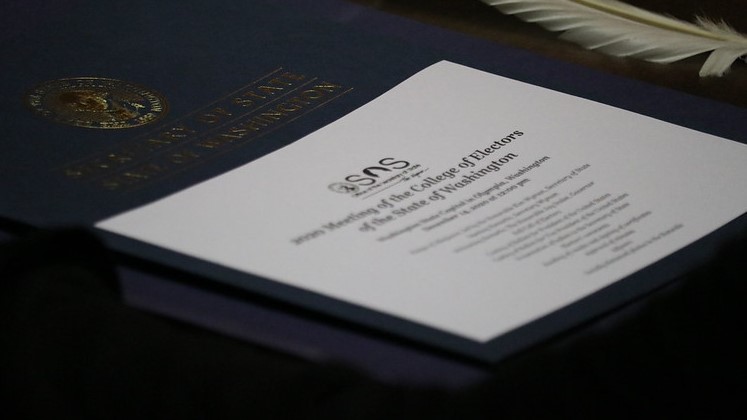 “Necessity is the mother of invention.” Those much-quoted words of Plato need an update for the 21st century: “Pandemic is the mother of effective governance”, writes Johnny Miller.
“Necessity is the mother of invention.” Those much-quoted words of Plato need an update for the 21st century: “Pandemic is the mother of effective governance”, writes Johnny Miller.
In the wake of the Covid-19 pandemic, the US has rolled out a series of actions, with incredible speed and rare bipartisanship, to mitigate homelessness, extend access to health care, and prevent unemployment. The Federal government is using its power – albeit belatedly – to procure and distribute health equipment to the states, and has guaranteed direct payments to millions of taxpayers. Just a few short weeks ago, US media would have derided acts such as this by any other country as beyond-the-pale socialism. And at state level, governments are using broad powers to control movement and commerce; acts that in normal times would be viewed as staggering overreach, especially in conservative areas – but which today are met with near-unanimous approval.
Thus far, government responses in the US to the coronavirus crisis have not included the type of surveillance-state data harvesting seen in other countries. Mobile phone tracing and facial recognition software have not been rolled out as they have in Asia and Africa. “Stay At Home” orders are being enforced compassionately and reasonably: access to outdoor activities (with appropriate distancing) remains, use of private vehicles is still unimpeded by police checkpoints, and there is wide discretion over which businesses may remain open.
It’s worth noting that the American approach comes as quite a shock for my friends in South Africa, Italy, China and even the UK, who have seen personal freedoms shrink drastically during lockdowns of varying degrees of severity. Only time will tell if the extreme restrictions on movement and privacy seen in a number of African states, for example, were worth it. Interestingly, people calling the US reckless have not directed nearly as much vitriol at Canada, Japan and Australia, which all have significant lockdown measures in place, although all have drastically lower infection and death rates than the US. Perhaps, as so often happens, America is the perfect lightning rod for the world’s attention.
Inevitable challenges – and criminal failures
Let me be clear: America’s ability to tackle the pandemic has been hampered by slow and sometimes contradictory responses at the Federal level, exacerbated by a self-absorbed, fickle President. Without a doubt, Donald Trump’s actions (and inactions) have cost lives. Decisive early action would have allowed the US to streamline its approach to testing, lockdowns, and medical supply procurement.
Some problems – including the lack of personal protective equipment (PPE) for healthcare workers and a shortage of ventilators – were surely inevitable when a once-in-a-century pandemic hit supply chains that had never been stressed in this way before. But other issues, like the lack of effective, rapid testing, are criminal failures that fuelled an explosively exponential rate of infections (at the time of writing, more than three times greater than that of Spain, the next worst-hit country) and the death of thousands. A lack of testing meant the US was unable to estimate the extent, and predict the spread and severity, of Covid-19 until people were already falling sick: without question, this was a critical error on Washington’s part.
Let me also be clear: the President’s daily press briefings are disgraceful. Trump’s off-colour attempts at humour, irrelevant asides about his polling numbers and other tangents, and statements about medical treatment made without benefit of medical expertise leave the impression that the national response is being badly bungled. Remember, these briefings are more than just policy discussions: they’re an essential opportunity to provide moral stewardship, comfort and guidance to 350 million people gripped with fear over the twin threats of a pandemic and a looming economic depression. We need leadership from Washington in a way that we haven’t in decades, and it’s failing.
However, it’s also important to note the strengths of America’s federal system, which is expressly designed to limit the ability of the Federal government to interfere in our local lives. This, I would argue, is a good thing. Can you imagine if the President had unfettered ability to dictate travel, economic and schooling decisions at a local level? Can you imagine a state of national emergency, with the Army patrolling the streets and Trump as Commander-in-Chief, and decisions on schools, hospitals and businesses made exclusively by Trump’s family and executive cabinet? In many other countries around the world, this is exactly the scenario that is playing out.
Locally made, nationally supported decision-making is essential
Americans are a diverse bunch, and the country’s tradition of localized decision-making is one of its great strengths. The biggest challenges in New York during this pandemic are not the same ones facing rural states such as Alaska or Montana. California and Washington State, where the curve is flattening as the rate of infection slows, should be free to be nimble and experimental in their approach, including easing restrictions on movement once the worst has passed, with the option of quickly reinstating them if necessary. Hawaii, a state comprised of islands that rely heavily on tourism and travel from the mainland, may need to take an entirely different approach to the other 49 states.
Local decisions should be localized. But they should not be taken without robust co-operation and due heed to international and national protocols for containing the pandemic. The Federal government should use its position as a funding mechanism and regulator to guide, inform, and when necessary force local entities to adhere to a national response plan. This should be supplemented by the assistance, resources and expertise of Federal agencies such as the Federal Emergency Management Agency (FEMA), the Department of Defense, and the Treasury, with its tremendous ability to fiscally stimulate local economies and dictate monetary policy. We can already see this happening.
What needs to happen now? The Federal government needs to take the lead in shaping interstate transport policies, including drastically curtailing domestic air travel, implementing and enforcing health standards in our supply chains and businesses in regards to interstate commerce, and procuring medical supplies, both domestically and abroad, using the strength of the national government to safeguard supply chains and ensure quality. Up until now, the Trump administration has taken a hands-off approach, leaving private industry to decide for itself how best to manage the safety, procurement and supply of companies’ own products. This needs to change, and encouraging signs (specifically from General Motors and others) show a subtle but important shift in policy.
The Federal government should also centralize research, production and dissemination of tests, treatments and vaccines, in close co-ordination with universities and industry, and harmonize that process by using all available levers (such as the Defense Production Act). Furthermore, it must strengthen and follow its national response plan to the virus, making it a living document that adapts to the pandemic’s fast-changing reality; it should be led by the Centers for Disease Control and Prevention (CDC), and messaging in press briefings should be coordinated and centralized, so as not to impede the implementation of crucial guidelines.

Lastly, Washington must open a nationwide special enrollment period for uninsured Americans to purchase health cover under the Affordable Care Act (Obamacare). Millions of unemployed Americans will have lost their health coverage along with their jobs, and only some states which operate their own health care exchanges have made it possible to sign up for new policies.
In a distributed decision-making framework, the Federal government needs to play a leading role, the most important role. Local leaders must be allowed to make decisions and act at a local level; Washington should have their back; and both should be on the same page as the scientific experts. The US must continue to rely heavily on the expertise and local experience of state governors. Andrew Cuomo in New York, Gretchen Whitmer in Michigan and Jay Inslee in Washington are all offering sterling examples of strong leadership, decisive legislating and regional cooperation that should be a model for states that are yet to go through the worst of the crisis.
Of course we must highlight and criticize the failures of our country’s approach, especially as the numbers of infected soar far beyond those of any other nation to date (although when compared with the European Union as a whole, the US has fewer infected people and fewer deaths). On the other side of this dark tunnel, there will be a moment of reckoning, when political leadership must be held to account, ideally via public hearings that will determine who, and what they knew and when, was responsible for what is playing out now.
But it’s also important to celebrate America’s successes, to hearten and strengthen the resolve of people desperate to hear some good news.
Profound shifts have come; systemic change must be pushed for
We should not underestimate the scope, speed and shift in policy that has already occurred during America’s Covid-19 emergency. Unemployment support, direct cash grants for individuals, loans for small businesses, health care relief: we need to stand up and celebrate Congress for achieving all of these victories, and commend the State governments that will largely implement them. Because Congress lacks a bully pulpit and a centralizing figure to whom people inevitably look in a crisis, senior figures such as House Speaker Nancy Pelosi and Senate Majority Leader Mitch McConnell are purposely, prudently taking a back seat to allow for clarity of messaging from the President, and Democratic presidential nominee Joe Biden is doing the same.
At the same time, out of the spotlight, Congress is also delivering critical, life-saving legislation that is reflective of a profound shift in political tone that has taken place in the course of just a few weeks. Now is the time to acknowledge and celebrate these achievements – while continuing to push for more in the hope that America will get systemic change, not just emergency relief.
We must not underestimate the dedication, resilience and sacrifice of America’s essential workers: not just the nurses, first responders and legislators, but the grocery clerks, gas station owners and garbagemen, too. The coronavirus pandemic is showing us, as perhaps never before in our lifetimes, the interconnectedness between classes, the fragile supply chains upon which we all depend, and the common humanity that we all share: essential truths that, too often, we overlook. Perhaps this is the moment that a near-unprecedented crisis will give birth to long-lasting political change and the reshaping of economies around healthy individuals and thriving local communities.
Nor should we underestimate our systems, including our federal system of government, our free media, and our economy, all of which are presently under tremendous strain. These systems are what constitutes US society: they are the fabric that holds us together. We must celebrate these systems of governance, accountability and prosperity for their robustness and strength, and for their durability in time of crisis. If we do critique them, let’s do so carefully, because in this dangerous moment they are all that stands between order and chaos.
In the US, as in the rest of the world, the decisions made in these extraordinary and difficult days will be studied in detail for decades to come. Let’s do our duty as citizens and trust in our systems, identify problematic areas for future consideration, and push forward with policies centered on care and compassion. Our future well-being depends on it.
- This article first appeared at the Atlantic Fellows for Social and Economic Equity programme blog.
- Featured image: Downtown Detroit, looking North from Hart Plaza, April 2020 © Johnny Miller millefoto.com.
Please read our comments policy before commenting.
Note: This article gives the views of the author, and is not the position of USAPP – American Politics and Policy, nor the the Atlantic Fellows for Social and Economic Equity programme, the International Inequalities Institute, or the London School of Economics.
Shortened URL for this post: https://bit.ly/3ah7OWb
About the author
 Johnny Miller – Atlantic Fellow for Social and Economic Equity
Johnny Miller – Atlantic Fellow for Social and Economic Equity
Johnny Miller is a photographer, journalist, and founder of Unequal Scenes and africanDRONE. He is based in both Detroit, USA and Cape Town, South Africa, and is interested in how to achieve healthy, prosperous and vibrant societies. Johnny is a BMW Global Responsible Leader, a News Fellow at Code For Africa, and an Atlantic Fellow for Social and Economic Equity at the London School of Economics. He tweets at @UnequalScenes.






